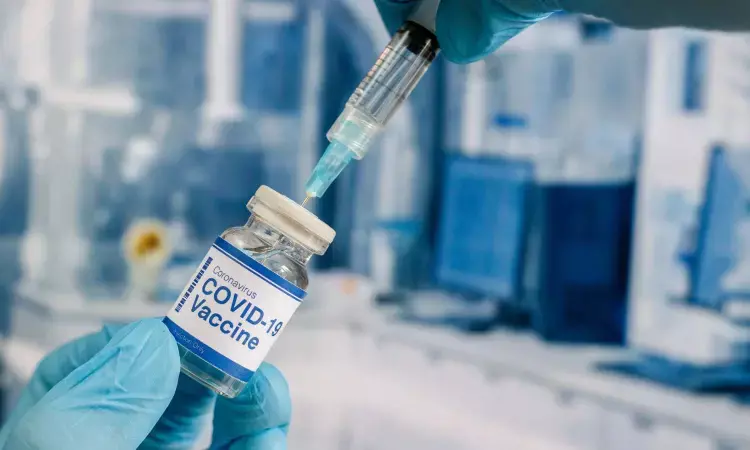- Home
- Medical news & Guidelines
- Anesthesiology
- Cardiology and CTVS
- Critical Care
- Dentistry
- Dermatology
- Diabetes and Endocrinology
- ENT
- Gastroenterology
- Medicine
- Nephrology
- Neurology
- Obstretics-Gynaecology
- Oncology
- Ophthalmology
- Orthopaedics
- Pediatrics-Neonatology
- Psychiatry
- Pulmonology
- Radiology
- Surgery
- Urology
- Laboratory Medicine
- Diet
- Nursing
- Paramedical
- Physiotherapy
- Health news
- Fact Check
- Bone Health Fact Check
- Brain Health Fact Check
- Cancer Related Fact Check
- Child Care Fact Check
- Dental and oral health fact check
- Diabetes and metabolic health fact check
- Diet and Nutrition Fact Check
- Eye and ENT Care Fact Check
- Fitness fact check
- Gut health fact check
- Heart health fact check
- Kidney health fact check
- Medical education fact check
- Men's health fact check
- Respiratory fact check
- Skin and hair care fact check
- Vaccine and Immunization fact check
- Women's health fact check
- AYUSH
- State News
- Andaman and Nicobar Islands
- Andhra Pradesh
- Arunachal Pradesh
- Assam
- Bihar
- Chandigarh
- Chattisgarh
- Dadra and Nagar Haveli
- Daman and Diu
- Delhi
- Goa
- Gujarat
- Haryana
- Himachal Pradesh
- Jammu & Kashmir
- Jharkhand
- Karnataka
- Kerala
- Ladakh
- Lakshadweep
- Madhya Pradesh
- Maharashtra
- Manipur
- Meghalaya
- Mizoram
- Nagaland
- Odisha
- Puducherry
- Punjab
- Rajasthan
- Sikkim
- Tamil Nadu
- Telangana
- Tripura
- Uttar Pradesh
- Uttrakhand
- West Bengal
- Medical Education
- Industry
Low-risk groups no longer require COVID-19 boosters, recommends WHO

USA: The WHO's SAGE (Strategic Advisory Group of Experts on Immunization) has released its updated COVID-19 vaccination guidance. The guidance was updated in light of the Omicron variant and widespread population immunity.
In its latest recommendation, the SAGE has considered high immunity levels due to prior infection and vaccination, prioritised highest-risk groups, and balanced COVID-19 vaccination for lower-risk groups with other preventive health actions. It introduces cost-effectiveness considerations for vaccinating lower-risk individuals, such as healthy children and adolescents, and presents revised booster dose recommendations.
The roadmap continues the prioritization of SAGE for protecting people at the highest risk of severe disease and death from SARS-CoV-2 infection and its focus on maintaining resilient health systems. It also considers the cost-effectiveness of COVID-19 vaccination for those at lower risk (healthy children and adolescents) compared to other health interventions. It also included revised recommendations on additional booster doses and spacing of boosters. The current COVID-19 vaccines’ reduction of post-COVID conditions is also considered, but the evidence on the extent of their impact is inconsistent.
In a statement, the WHO laid out three prioritization tiers for COVID-19 vaccination-high, medium, and low-based on risk for severe disease and death. These priority groups consider vaccine cost-effectiveness, performance, community acceptance, and programmatic factors.
The highest tier includes older adults, younger adults with underlying health conditions, pregnant women, immunocompromised people ages six months and older, and frontline health workers. For this group, they recommend a booster shot 6 or 12 months after the last dose, depending on age and underlying conditions. It emphasized that the interval applies only to the current epidemiological situation and isn't a recommendation for annual boosters. "The aim is to serve countries planning for the near- to mid-term," it said.
The medium priority group includes healthy adults younger than 60 and children and adolescents with underlying conditions, who should get their primary series and one booster. Though additional boosters are safe, SAGE didn't recommend them because public health returns are relatively low.
The low-priority group includes healthy children and adolescents as old as 17. The experts said the primary series and booster doses are safe. Still, owing to the low disease burden, countries should base their decisions on various factors, including cost-effectiveness and other health priorities. It added that the public health impact of vaccinating healthy kids against COVID is lower than the benefits of other routine vaccinations such as rotavirus, measles, and pneumococcal conjugate.
The group also assessed the data on the impact of the COVID-19 vaccine on long COVID, but evidence on the extent of the impact was found to be inconsistent.
“Updated to reflect that much of the population is either vaccinated or previously infected with COVID-19, or both, the revised roadmap reemphasizes the importance of vaccinating those still at risk of severe disease, mostly older adults and those with underlying conditions, including additional boosters,” stated SAGE Chair Dr Hanna Nohynek. “Countries should consider their specific context in deciding whether to continue vaccinating low-risk groups, like healthy children and adolescents, while not compromising the routine vaccines that are so crucial for the health and well-being of this age group.”
Dr Kamal Kant Kohli-MBBS, DTCD- a chest specialist with more than 30 years of practice and a flair for writing clinical articles, Dr Kamal Kant Kohli joined Medical Dialogues as a Chief Editor of Medical News. Besides writing articles, as an editor, he proofreads and verifies all the medical content published on Medical Dialogues including those coming from journals, studies,medical conferences,guidelines etc. Email: drkohli@medicaldialogues.in. Contact no. 011-43720751


